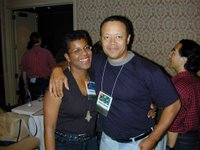
About Me
My Meez

Recent Entries
Archives
Personal
Interesting Sites
RAINE'S BLUES
GOLD MOUNTAIN
AGAIN
In Stores


Watch mini trailer

Clip of places featured in Again

Need Flashplayer to view. Give time to load.
TOOL & BAD BOYS
Short, Short Ebooks
|
Monday, February 27, 2006
Author Tananarive Due remembers Octavia Butler Speculative and horror fiction author Tananarive Due and her husband, author Steven Barnes, (also a speculative fiction writer) were good friends of Octavia Butler (at one time all three resided in Seattle). In an eloquent essay she sent out to the members of her AOL group, Ms. Due remembers her friend. She has given me permission to reprint her essay here and I do so gladly:
All that you touch You Change.
All that you Change Changes you. The only lasting truth Is Change. God ls Change.
-Earthseed: The Books of the Living (from Octavia E. Butler’s Parable of the Sower)
On Octavia E. Butlerby Tananarive DueEven for writers, words can fail us. It has taken me twenty-four hours to find the words.
In speculative black fiction, we are a very small family. Our matriarch has died.
Sunday morning, when a magazine reporter sent me word that Octavia Butler had died, I didn’t want to believe it. I saw nothing in the news nor on the Web. I called Octavia’s home number and listened with a pounding heart as her phone rang. Once. Twice. Three times. I delighted – for just a bare instant – when the ringing stopped and I heard her voice.
On her answering machine. Already distant, clearly a recording. But Octavia’s voice.
I stammered a message. What to say? Are you alive or dead? “I’ve...heard something...and I was hoping to speak to Octavia...” I stopped, nearly sobbing. In that instant, I understood the futility of the act. We cannot call the dead on the telephone.
I thought of the other times I had called her – never enough, it turns out – when I tried to make our conversations brief, never able to fight the certainty that I was pulling her away from a stream of brilliant thoughts. Once, she apologized for the loud music playing in the background. It turned out that Octavia, like me, enjoyed listening to music while she wrote. How many times did I hesitate to dial her number simply because I didn’t want to disturb her?
I was introduced to the works of Octavia E. Butler when a friend of mine, a writer and columnist named Robert Vamosi, insisted I must read her. I read Kindred, her time-travel story of a contemporary black woman who is periodically flung back into the Antebellum slavery period, and I was floored. I often say that between Alex Haley’s Roots, Toni Morrison’s Beloved and Butler’s Kindred, we can come no closer to experiencing slavery, and its legacy, in America.
I advise people to read Kindred first, because it serves as such a wondrous bridge to speculative fiction. After that, some readers will insist it should be Wild Seed and the Patternist series. But I often suggest Parable of the Sower. In it, Butler creates her own religion – a religion that embraces change.
All that You touch You Change. (You touched us, Octavia)
All that you Change Changes you. (You had to know how much we loved you)
The only lasting truth Is Change. (It was inevitable that we would lose you)
God is Change.
****
I met Octavia in person in 1997, when Clark Atlanta University sponsored a conference entitled “The African-American Fantastic Imagination: Explorations in Science Fiction, Fantasy and Horror.” There, I also met a science fiction writer named Steven Barnes, who would soon become my husband. Steve had known Octavia for years. That conference at Clark was a remarkable family reunion.
At the time, I had published only one novel, The Between. I floated on air as I was asked to pose in a photo with such prolific writers as Octavia, Steve, Jewelle Gomez and Samuel R. Delany. In 2000, visiting Octavia’s home with Steve to interview her for a piece we wrote for American Visions magazine, I was surprised to see that photo from Clark hanging on her wall.
“My other family,” she explained.
Octavia was well that day. She would not be well in subsequent meetings.
She was fighting a cold when I saw her in Seattle at the “Black to the Future” science fiction conference in June of 2004, when she was happy to meet our new baby, Jason, but she didn’t want to give him germs. She was sick again when I saw her in New York for the Yari Yari Pamberi International Conference of Literature by Women of African Ancestry in October that same year. I cautioned her to be careful about too much travel. Subsequently, I have learned that Octavia was far more ill than I knew. The New York Times reported Monday that she could only walk a few steps without having to stop to catch her breath.
Like most people, I cannot say that I knew Octavia well. But in the too-brief time I knew her, I saw many sides of her. Her fierce disappointment with mankind’s worse habits. Her girlish side. Her goddess side. Her insecure side.
Last summer, Octavia asked me to write a quote for her upcoming novel, Fledgling. I was on my own deadlines, trying to juggle the jobs of new mother, novelist and fledgling screenwriter, but I said YES. I was honored even to be asked. Octavia sounded almost apologetic, as if the book embarrassed her. She explained that her medication made it difficult to write. “I’m sure it’s brilliant,” I assured her. (I don’t regret leaving too much unsaid, at least).
This past Christmas, we sent Octavia a photo of Jason on Santa’s lap and said we hoped she was feeling better. Octavia could not have been feeling well when she sent out her own cards this year, but hers were always among the first to arrive. She wrote to us: Have a creative, prosperous New Year down there in California where it’s WAY too warm.
I must call her soon, I thought many times these past two months. I must call Octavia.
But what if she is writing?
Sharon Cullars Coffee Talk at 2/27/2006 12:56:00 PM
Permanent Link
|
|
Home
---------------oOo---------------
|
|







 Speculative and horror fiction author Tananarive Due and her husband, author Steven Barnes, (also a speculative fiction writer) were good friends of Octavia Butler (at one time all three resided in Seattle). In an eloquent essay she sent out to the members of her AOL group, Ms. Due remembers her friend. She has given me permission to reprint her essay here and I do so gladly:
Speculative and horror fiction author Tananarive Due and her husband, author Steven Barnes, (also a speculative fiction writer) were good friends of Octavia Butler (at one time all three resided in Seattle). In an eloquent essay she sent out to the members of her AOL group, Ms. Due remembers her friend. She has given me permission to reprint her essay here and I do so gladly: